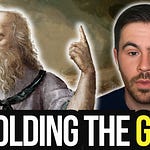In the last essay, we explored Peterson’s solution to the Meaning Crisis and how cultivating wisdom and virtue can help to orient our meaning instinct properly. We finished the last essay with the latest research on the science of wisdom and the two core conceptions of meta-cognition and moral grounding, which we will explore in this essay on how to cultivate each of these skills.
Cultivating Meta-Cognition
Meta-cognition is basically “awareness of our own mind”; it is thinking about our own thinking, and all philosophy aims to cultivate meta-cognition. Some examples of the meta-cognitive processes include intellectual humility, paying attention to multiple perspectives, and regulating your emotions when facing a challenging situation. I’m sure this last one sounds pretty familiar, as we have already discussed in-depth this in the Stoicism essay, and there is a reason for this connection. John Vervaeke argues that Stoicism turned Socrates “into a systematic set of psycho-technologies that you internalise into your meta-cognition”.
Internalisation is a key concept for improving meta-cognition. Social psychologist Leo Vygotsky first discovered internalisation to describe knowledge transfer; he hypothesised that we imitate others and internalise their perspectives in order to develop new ways of thinking. Vervaeke provides the example of a child learning from an adult. The adult has a more complete perspective from the child, so the child imitates the adult to fill in their perspective. This imitation builds an inner representation, a model, of the adult’s perspective on their perspective, which affords meta-cognition. Through the inner representation, the child can self-correct and transcend their own perspective.
Through meta-cognition, we can take perspectives on our own perspectives in order to bootstrap ourselves and solve complex problems. Impressive as this ability is, you can see how it is not a perfect solution because none of our perspectives are perfect, and therefore our inner representations are fluid; they require updating, which is really the work of philosophy.
Philosophy is all about cultivating meta-cognition. We can see this enhancement of perspective in ancient philosophy. For example the stoic spiritual exercise of ‘internalising the sage’.
This exercise is where you imagine a sage, and then you start to allow them to critique and shape your actions - it is the perennial; what would Jesus do? The sage becomes your aspirational self that you are imitating and hence internalising. By choosing and learning from a sage, for example, Socrates, we build an inner representation that is more complete than our own and use it to self-correct and improve ourselves - remember, as the adult is the child, so the sage is to the adult, so the sage is an example of a mature individual. By taking on the sage’s perspective on our perspective, which affords us more avenues of self-transcendence. This practice provides us with a key avenue to improve meta-cognition, which is expanding our imagination and our stock of inner mental representations to increase our ability to self-correct, and all of this comes through what is commonly known as the conscience.
The Role of Conscience in Meta-Cognition
Our creation of inner representations for self-transcendence is similar to how AI large-language models function. The Large Language model, for example, ChatGPT, pools a large amount of data into a model and then uses this pool of data to make predictions on what word comes next. You can use ChatGPT like another person and ask, for example, what would Socrates say or think?
In some sense, our conscience is doing something similar thing. The conscience is an inner representation of an authority figure, built up from our experience of authority figures in general. We use this conscience to critique our actions and provide a bigger-picture view of life. This framing can help us see how our conscience is both limited and ahead of us at the same time; limited by our experience of authority figures but ahead of us as a representation of a higher perspective on our own perspective, which provides a portal to self-correction correction and hence self-transformation.
The connection between the conscience and personal change or transformation is often not clear, but it is centrally important. An obvious example of this is a psychopath who lacks a conscience and, therefore, cannot change. The mark of psychopathy is a refusal to pay attention to one’s errors and to adapt - this is why psychopaths are parasitic and frequently move around because they are unable to maintain their cover for long because they can’t adapt to changing relationships. Psychopaths lack a conscience, or perhaps at one point had a conscience but killed it.
How do you improve your conscience?
Peterson describes the human imagination as a “game engine in your head” where you can produce an avatar and walk them down potential pathways to consider outcomes and then choose the outcomes you want - and that this is the discovery of the future!
The future we often consider as a reality like the present, but really the future is the human ability to perceive and predict patterns in the imagination. Then the skill of actualising the future is first perceiving the future we desire and then stringing together action sequences necessary to actualise that future. So training your imagination to get good at picking up on these real patterns means you can choose the actions necessary to get the desired outcomes, and in identifying real patterns and conforming your actions and habits to these real patterns, you are self-realising, the key word being real-ising.
How do we pick up on real patterns? The Socratic solution is dialogue, you dialogue with others and internalise their perspectives on your perspectives, and this leads to a more well-rounded, complete, inner representation, and then in addition to this, you dialogue with your conscience; you listen and ask questions and make sure it is oriented toward the truth. You make sure your conscience is oriented toward the truth because what you want to perceive are real patterns, reality, the truth.
Another level above this is that the use of dialogue also applies to the great works of literature, philosophy, art etc and what is called the ‘great cultural conversation’ that has been going on since the dawn of recorded time. In absorbing the classics, great works, and spending time with brilliant thinkers, you expand your inner representation with the stored and refined wisdom of generations, which you then internalise and which offers you greater internal advice and guidance. Once you do enough of this work you can develop a ‘meta-cognitive perch’, which is an inner space from which you can evaluate information and actions to ensure you behave in accord with the highest principles - this developed and educated conscience is a necessary step to living a good life.
We often think of conscience as a moral thing and not as a skill that you can work on, but this is what I am proposing. People who are in touch with their conscience are called conscientious (the word means regulated by conscience). Conscientiousness is a personality trait associated with the tendency to be responsible, organised, hard-working, and goal-directed and to adhere to norms and rules; conscientiousness comprises self-control, industriousness, responsibility, orderliness and reliability. So because of the functionality of one’s inner representations and a good working relationship, one can achieve goals and hence maintain positive emotions (as we discussed in the stoicism essay). Conscientiousness as a personality trait is the second best predictor of lifetime success and a predictor of lifetime health and life expectancy, so if you want to be successful, healthy and live a long time, you need to be conscientious! Conscientious people listen to their conscience but also have a functioning inner representation to listen to, and they take responsibility for their lives which helps them organise across time, i.e. into the future.
So, to return to Peterson’s solution to the Meaning Crisis, the conscience is an inner representation of an authority figure and can be improved imaginally by internalising the sage, whoever that might be for you; the conscience then gets better at drawing our attention to our mistakes and if we correct those mistakes we improve our error-ridden character, which affords us picking up on more real patterns and hence we make better predictions, and hence achieving more desired outcomes. The payoff for increasing meta-cognition is an improved ability to orient ourselves in the world and regulate our behaviour towards our desired goals. This helps us achieve our goals and organise our lives, which minimises negative emotions.
What I’m arguing here is that conscience is a skill and something that can be improved if one is willing to learn. This improvement is most evident in people with ADHD, ADHD is essentially low conscientiousness, and this is because of a deficit of executive functioning, which is not simply a moral failing but a developmental disorder, and which is treated with primarily environmental interventions, like writing things down, using a schedule, timers and getting people to keep you accountable because this externalises the deficient internal representation and starts to build a new one. ADHD is an extreme example of this, but we all need to build that conscientiousness to live a good life, so developing a better relationship with your inner representations, developing the inner representation by encountering the great people of history, is the start of a genuine moral education.
Becoming Morally Grounded
Here is an excellent time to return to the second wisdom concept: being morally grounded or morally aspiring. This is important because we often get morality really wrong in the modern world. The quote we started this series with was,
“Morality begins in paying attention to what you don’t want to pay attention to but should attend to”, which indicates that morality isn’t just about choosing the right and wrong but, as Iris Murdoch says, is about a “just mode of vision” - seeing what one should see i.e. reality, rather than just seeing what you’d like to see, self-deception.
I would argue this is the basis for a universal morality, rooted in the cognitive science solution to the frame problem and the problem of perception that is “to be a cognitive agent is to see the world through a frame of value” (see these other essays for more detail on this). This connection between perception and values is not culturally relative, it is universal for all cognitive agents to be cognitive agents at all! In contrast, while the frames of value may vary from culture to culture; the requirement of a frame of value to perceive does not. So to perceive is to see the world through a frame of value, so what is the best frame of value? How do we justify what we perceive? What should we perceive? What should we attend to? And what should we ignore? This negotiation is the start of ethics and morality. We have an implicit frame of value, so negotiating and transforming that frame of value into contact with the truth is the journey of ethics - ethics and epistemology are really one and the same.
A good example of ethics in action this way comes from Iris Murdoch in her book “The Sovereignty of The Good”. The example goes like this:
“A mother, whom I shall call M, feels hostility to her daughter-in-law, whom I shall call D. M finds D quite a good-hearted girl, but while not exactly common yet certainly unpolished and lacking in dignity and refinement. D is inclined to be part and familiar, insufficiently ceremonious, brusque, sometimes positively rude, and always tiresomely juvenile. M does not like D’s accent or the way D dresses. M feels that her son has married beneath him …Thus, much for M’s first thoughts about D. Time passes, and it could be that M settles down with a hardened sense of grievance and a fixed picture of D, imprisoned by the cliché: my poor son has married a silly vulgar girl. However, the M of the example is an intelligent and well-intentioned person, capable of self-criticism capable of giving careful and just attention to an object which confronts her. M tells herself: ‘I am old-fashioned and conventional. I may be prejudiced and narrow-minded. I may be snobbish. I am certainly jealous. Let me look again.’ Here I assume that M observes D until gradually her vision of D alters … D is discovered to be not vulgar but refreshingly simple, not undignified but spontaneous, not noisy but gay, not tiresomely juvenile but delightfully youthful, and so on…”
In this example, we can see how the “moral action” taken is really a kind of careful attention to error correction and the re-evaluation of her unconscious framing of the situation and her Daughter-in-law - making a moral effort to see what really is, rather than confusing her value judgements for the person in front of her, which is really a kind of egocentrism, and what actually is. Here we can see the negotiation, the re-evaluation, the humility and inner dialogue in pursuit of the truth, motivated by love of what is. This is why Iris Murdoch says, “love is the incredibly difficult realisation that someone other than oneself is real” - it is the moral effort to see past one’s necessary but not sufficient categories to the reality behind that contains courage, truth, justice, wisdom, temperance, and is all encapsulated in this “mode of vision”. We can see in this example how this type of ethics functions and is really about improving perception through re-evaluation, dialogue and pursuit of the truth; it is deeply socratic in its essence.
This entire series has been about a similar transformation as the one the mother goes through, a conversion of attention. Mostly we think about conversion in a religious sense and as a conversion of one’s beliefs. However, the original Latin convertere means “to look or turn around” and was specifically about a change of attention. The change of attention is an “inward turn” to ignore the sound and fury of the external world and to “know thyself”, which is, as Socrates describes “seeing your own seeing”. We will look at this further in the next essay, but it is through this turn to the self, to get to the bottom of one’s own being, that we get to the ground of Being itself, also known as God. A paradoxical image that it is through the self that you reach the truly divine other, but it is this pilgrimage that goes on everywhere and always that we will meditate on in the last essay of the series and hopefully tie together some of the last remaining strands on philosophy and self-development.












